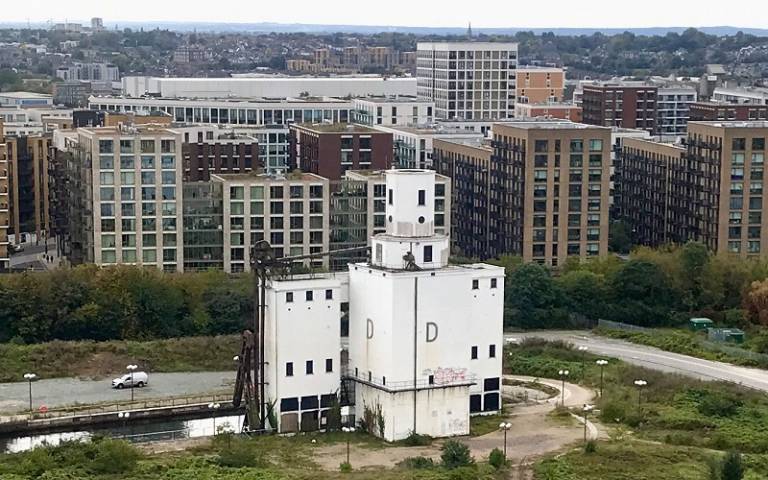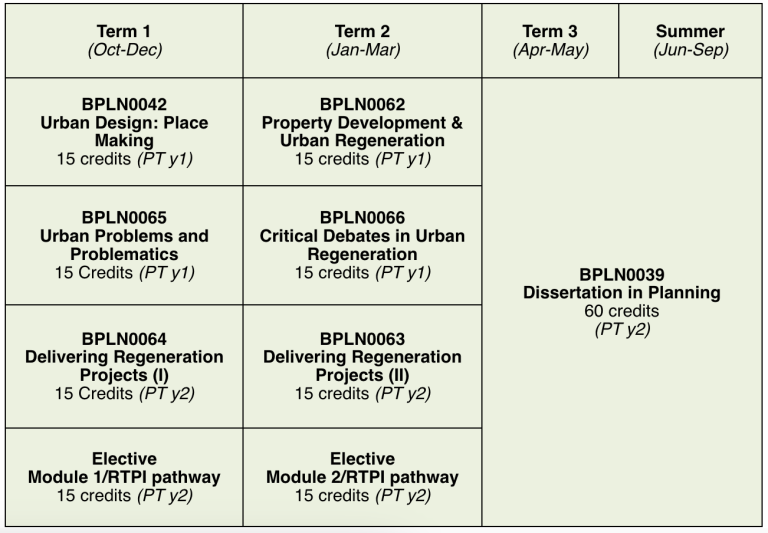The Urban Regeneration MSc addresses the challenge of urban decline and the planned recovery of our neighbourhoods and cities.

About the course
This MSc addresses the challenges of places in need of rejuvenation, reinvention or complete restructuring in the wake of changes to the functioning of contemporary urban environments. From single buildings to neighbourhoods, towns, and whole cities, urban areas go through cycles of growth and decline, and periodic regeneration in whole or in part is inevitable.
Drawing on theory and practice, you will learn how and to what extent the governance, planning, design, and management of the built environment can help to regenerate ‘places in need’, with what resources (human, financial and governmental) and with what consequences for communities and citizens.
Why choose to study urban regeneration at The Bartlett?
We offer:
- Hands-on, multidisciplinary education with input from globally distinguished theorists and practitioners.
- A course that draws on the best of UK and international planning and regeneration experience.
- Teaching staff with diverse professional and academic backgrounds from around the world, all with a passion for urban regeneration.
Who should apply?
The Urban Regeneration MSc was established in 2001 and has since been preparing urban regeneration professionals from across the world. If you want to be part of our next cohort of urban experts tackling the challenges of cities and places in need of urban regeneration, we welcome you to apply.
Course structure
To graduate from the Urban Regeneration MSc, you will need to complete and pass 180 credits. More specifically, you will complete:
- Six core modules weighing 15 credits each, amounting to a total of 90 credits in core modules;
- Two optional modules weighing 15 credits each, amounting to a total of 30 credits in optional modules that will enable you to develop your own particular interests; and
- A dissertation amounting to a total of 60 credits.
The following diagram illustrates the structure of the Urban Regeneration MSc:

Accreditation
Depending on the optional modules you choose, you can pursue either the RTPI Specialist Accreditation Route or the RTPI Combined Accreditation Route. Both routes allow you to apply for a RICS membership.
- The RTPI Specialist Accreditation Route: This route is for those who already have an RTPI Accredited undergraduate degree. You can choose a specialism from those offered in the Bartlett School of Planning such as sustainability, real estate, housing, international planning, transport, urban design etc.
- The RTPI Combined Accreditation Route: This course is for those who wish to obtain RTPI accreditation, and who do not hold an accredited undergraduate degree. You will need to take either ‘Spatial Planning: Concepts and Context’ or ‘Comparative Planning Systems and Cultures’ and ‘BPLN0055 Planning Practice’ as optional modules.
Field trips
The Urban Regeneration MSc includes a residential field trip during where we explore themes that are relevant relevant to the course throughout different contexts. This field trip offers our students an opportunity to consider built environment issues in real world settings and network within the community of the course.
The cost of travel and accommodation for the field trip are covered by UCL although students will need to cover meals and other personal expenses.
Flexible study
There are a number of different routes to the MSc in Urban Regeneration: one year for full-time students, or two years (and up to five years) for part-time students.
Individual modules may also be taken as free-standing training elements and accumulated towards intermediate certificate qualifications, as well as the master's degree.
We make every effort to accommodate modular students, however the Urban Regeneration MSc is not a day release course. Please see the FAQ section below for more information.
- Core modules
- Urban problems and problematics (15 credits)
- Urban design: Place making (15 credits)
- Delivering regeneration projects (I) (15 credits)
- Property development and urban regeneration (15 credits)
- Delivering regeneration projects (II) (15 credits)
- Critical debates in urban regeneration (15 credits)
- Dissertation in planning (60 credits)
- Read more about our topics to help you specialise through your studies
In addition to the range of optional modules on offer across The Bartlett Faculty of the Built Environment (subject to availability), you can use your optional modules to specialise in subject areas offered by the The Bartlett school of Planning in more depth. Our specialisms operate best in module pairs, but many of these modules can also be taken as standalone units.
Our specialism topics at The Bartlett School of Planning include:
Infrastructure Planning:
This specialism consists of two modules addressing the question 'what constitutes a successful infrastructure project, programme or plan'. The first module 'Infrastructures as Agents of Change' defines the characteristics of infrastructure projects, programmes and plans of various kinds and examines their roles as agents of change. It encompasses an understanding of past perspectives of the role of such investments and investigates 21st century perspectives in a context of global interdependencies of economic growth and environmental impacts as sustainability concerns loom large as key challenges. The second module 'Critical Issues in Infrastructures Funding, Finance and Investment' focuses on issues that cross all infrastructure sectors in the developed and developing world. It examines challenges seen to be critical to sustainable investments. While not exhaustive, the module examines the: role of PPPs, impacts of corruption, ‘Section 106 & Community Infrastructure Levy, Property value uplift and Tax Incremental Financing and impact of fiscal devolution.
Investigating Urban Transformation in Historic Cities:
This specialism provides interdisciplinary theoretical and practical tools to investigate the context and dynamics of urban transformation in historic cities. The two modules, 'Planning Discourses for Historic Cities' and 'Planning Practices in Historic Cities', analyse planning processes - both discourses and practices - used to conceptualise and regulate the rate and direction of physical change in historic urban environments. The specialism is open to students from different backgrounds and Masters programmes who are passionate about querying the complexities of urban conservation and development from different perspectives (research, policy, design and practice).
Planning for Housing:
This specialism examines the context for and process of residential development in the UK and is divided into lecture-based and project-based components. The lecture-based component, 'Planning for Housing: Process', begins by looking at the drivers of residential development including the demographics of growth. It considers who provides housing and at the evolution of the UK policy context and its current objectives. The component then looks at the residential development process from strategic and development planning, land acquisition to the occupation of homes under different tenure arrangements. The lecture programme is divided into three parts: concerned firstly with broad perspectives on housing growth, policy and planning; secondly, with housing providers, processes and delivery; and thirdly, with critical debates and outcomes today. The project-based component, 'Planning for Housing: Project, challenges students to apply and extend their knowledge of development drivers, actors and practices to real-life housing development opportunities in London. Via small group organisation, students will co-ordinate the completion of a comprehensive feasibility study and housing development brief for a specific site. Groups will be allocated strategic mandates reflecting the current policy context and objectives explored in 'Planning for Housing: Process' and will then plan, design and initiate the implementation of a development scheme from a selected development actor perspective, reflecting tenure, design, and organisational intentions. Schemes will be collectively proposed and managed and then presented by each team to an audience of peers, staff and relevant experts in the field.
Planning for Sustainability, Climate Change and Inclusion Planning for Urban Design:
This specialism looks at the inter-related themes of sustainability and inclusion. In the term one module 'Planning for Sustainability and Inclusion', a variety of conceptual issues surrounding the governing process for achieving urban sustainability are examined alongside the challenges involved in defining and achieving inclusion in the planning process. Students then have a choice in term two. If they wish to focus more on environmental sustainability and, in particular, the climate emergence, they can take 'Sustainability, Resilience and Climate Change'. If they wish to delve further into the problematics of inclusionary planning, they can take the 'Participatory Urban Planning Project'. Both of the term two modules take the form of a project, pursued through teamwork and in collaboration with external stakeholders.
Planning for Urban Design:
This specialism considers design across a range of different scales of operation, from those dealing with settlement form, to those dealing with land use mix, to those concerned with detailed design and individual site layout and comprises 'Urban Design: Density and Form' and 'Urban Design Governance'. To that extent planning is undoubtedly a design discipline and planners need to be aware of, and be concerned with, the design consequences of their decisions on the ground. To explore this role, the Urban Design Specialism is divided into two parts, reflecting the two primary means through which planners engage in urban design – first as members of collaborative design teams, who critique and advise on design proposals, and second as policy and guidance writers. Part one examines the design process through analysis, critique and the generation of alternatives for site-specific design projects. Part two addresses the process of design guidance writing and implementation.
Smart City Theory and Practice:
Run by UCL’s Centre for Advanced Spatial Analysis (CASA), these modules give you an introduction to the theory and science of cities, and technological perspectives on ‘smart cities’. Term one deals with more general perspectives on cities developed by urban researchers, systems theorists, complexity theorists, urban planners, geographers and transport engineers will be considered, such as spatial interactions and transport models, urban economic theories, scaling laws and the central place theory for systems of cities, etc. Term two then looks more specifically at the development of smart cities through a history of computing, networks and communications, of applications of smart technologies, ranging from science parks and technopoles to transport based on ICT. The course will cover a wide range of approaches, from concepts of The Universal Machine, to Wired Cities and sensing techniques, spatio-temporal real time data applications, smart energy, virtual reality and social media in the smart city, to name a few. Overall, students will develop a critical approach to more technological and quantitative understandings of the development and management of cities.
Sustainable Development Themes and Goals:
This pair of modules is concerned with sustainable development in relation to the theory of urban development and spatial planning practice in cities associated with sustainable development goals. The first module 'Sustainable Urban Development: Key Themes' focuses on sustainability debates and literature, with a specific focus on cities. The second, 'Sustainable Development Goals and Spatial Planning', explores how the Agenda 2030 and Sustainable Development Goals (SDGs) are implemented at the local or municipal level in cities.
Urban Regeneration:
This specialism is concerned with innovation, urban and regional economic development and regeneration and comprises two modules – 'Urban Regeneration: Urban Problems and Problematics' (term 1) and 'Delivering Regeneration Projects II' (term 2). The issues are analysed in the context of development economics, the new space economy, the agglomeration of innovative high-technology industries, the concepts of the innovative and creative milieu and emerging forms of urban governance. These analyses are brought to bear on project work, which allows for the examination of the relationship between those broad trends and specific local contexts and processes. The specialism comprises 2 modules: the first focuses on the theoretical framework for the understanding of the spatial and socio-economic dynamics of contemporary cities, the second is structured around a project in which students are invited to apply the theory and develop their own strategies for the regeneration of a locality.
If you seek RTPI accreditation you must take and pass the following electives:
- Planning practice
And a choice of one of the following two modules:
- Spatial planning: Concepts and context
- Comparative planning systems and cultures
More details of these modules can be found in the UCL module catalogue.
Please note that the course structure and list of modules given here is indicative. This information is published a long time in advance of enrolment and module content and availability are subject to change.
Careers and employability
We place great emphasis on fostering creativity and on promoting alternative measn of expression. Therefore, our students have the opportunity to participate in a variety of additional activities that boost their employability, including:
- Workshops with academic and professional partner organisations in the UK and overseas. Qualifying students spend time working with local stakeholders, academics and other postgraduate students on addressing real-life regeneration issues. In recent years, students and staff from the Urban Regeneration MSc have participated in workshops with the UCL Just Space Network, the Ateliers Cergy 2009 and the UN Habitat EUSS Workshop.
- Collaborations with the private sector. In 2011, Urban Regeneration MSc students taking the module 'Delivering Regeneration Projects (II)' worked together with Buro Happold on two case study projects aiming at answering the question: "Do the benefits of Crossrail go to those that need them?" Students' research findings were presented in a workshop attended by UCL staff, students and Buro Happold staff.
Our alumni
Graduates of the Urban Regeneration MSc moving into the world of work typically take jobs in a wide variety of public and private offices in the UK and around the world, especially in consultancy firms, voluntary sector organisations and local, regional or national agencies.
First job roles and workplace destinations of recent graduates include:
- Urban Strategist at Foster & Partners
- Research Consultant at Regeneris Consulting
- Technical Director at Colombian Green Building Council
- Graduate Planner at Mott McDonald
- Planner at Fudan University Urban Planning and Architectural Design Institute in Shanghai
- Freelance Planning and Regeneration Consultant in Santiago
- Senior Project Manager at The Glass House
- Business Growth Communications Manager at Circle Anglia Housing Association.
UCL boasts a very dynamic alumni network of more than 150,000 members. In addition to the UCL network, once you graduate from the Urban Regeneration MSc you will have the opportunity to join our course-specific alumni network on LinkedIn which allows you to connect with your peers and graduates before you, and attend attend events especially organised for alumni of the Urban Regeneration MSc.
Staff
- Programme Director
Dr Sonia Freire Trigo
View Sonia's profile- Teaching staff
Professor Matthew Carmona
View Matthew's profileProfessor Claudio de Magalhaes
View Claudio's profileDr Nikos Karadimitriou
View Nikos's profileDr Susan Moore
View Susan's profileProfessor Mike Raco
View Mike's profile
Frequently Asked Questions (FAQs)
- Can I study for the Urban Regeneration MSc on a part-time basis?
We offer a number of different routes to the MSc in Urban Regeneration: one-year of full-time study, or two years (and up to five years) for part-time students.
Individual modules may be taken and accumulated towards intermediate certificate qualifications, as well as the Masters degree.
Students taking the course part-time are charged fees on a pro-rata scale.
- How much a time commitment does studying for the Urban Regeneration MSc involve?
If you wish to study on a full-time basis, you should dedicate at least 1,800 hours for lectures and self-guided study.
If you wish to study on a part-time basis then your time commitment will vary depending on the number of credits you choose per year. However, you should roughly expect to dedicate at least 150 hours per 15-credit module.
- Is the Urban Regeneration MSc a 'day-release' course?
We make every effort to bundle teaching for the core modules on two or three days per week and have been able to do so since the beginning of the course. This means that students studying on a part-time basis can attend lectures on one day, or one and a half days, per week. Due to timetabling and venue availability restrictions, we cannot guarantee that we will be able to offer this every year. There is also no guarantee that the optional modules you may choose will be offered on the same day as the rest of your classes. Your coursework may require you to dedicate more than one slot per week on fieldwork or study.
- Does UCL offer financial support to MSc students?
Yes, there are several opportunities for financial support. Please visit The Bartlett School of Planning's Funding and scholarships page for more detailed information.
- What professional accreditations does the Urban Regeneration MSc offer?
Please refer back to the 'Course highlights' and 'Course structure' sections of this webpage for more information.
- What type of tutorial and personal support is offered to students of the Urban Regeneration MSc?
UCL operates a very helpful student support service. Additionally, each student of the Urban Regeneration MSc is allocated a personal tutor with whom they can meet both in regular intervals and upon request to discuss your academic progress and personal concerns.
 Close
Close


